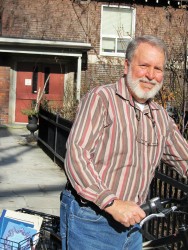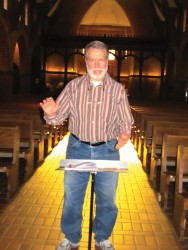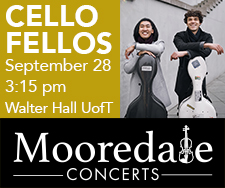“And therefore take the present time …”
 JOHN TUTTLE POSSESSES a great and generous sense of timing. One of this city’s most successful and well-loved classical musicians, Tuttle has had a long list of jobs and employers throughout his career as one the country’s great organists, most dedicated church musicians and most efficient and humble choir conductors. These include St. Paul’s Anglican Church, the Canadian Children’s Opera Chorus, the University of Toronto (as University Organist, organ teacher, conductor of the Hart House Chorus and Organist and Choirmaster of Trinity College Chapel), St. Thomas’s Huron Street and the Exultate Chamber Singers.
JOHN TUTTLE POSSESSES a great and generous sense of timing. One of this city’s most successful and well-loved classical musicians, Tuttle has had a long list of jobs and employers throughout his career as one the country’s great organists, most dedicated church musicians and most efficient and humble choir conductors. These include St. Paul’s Anglican Church, the Canadian Children’s Opera Chorus, the University of Toronto (as University Organist, organ teacher, conductor of the Hart House Chorus and Organist and Choirmaster of Trinity College Chapel), St. Thomas’s Huron Street and the Exultate Chamber Singers.
Over each of the past thirty years, Tuttle’s range of activities has been wide and varied, but the constant has been Exultate. Founded by Tuttle in 1981 as an outlet for students of the university’s Faculty of Music to sing for fun, Exultate has grown into one of the most well-respected, disciplined and classy chamber choirs around. Tuttle announced at the beginning of last season that the choir’s 2010-2011 30th anniversary season would be his last at the helm and he conducts his final concert with them on Friday May 13 at Grace Church on-the-Hill.
“It’s time,” Tuttle said, over lunch recently. “I’ve enjoyed my experience with the choir, but with the 30th anniversary looming it seemed to me as good a time as any to move over and give someone else a chance.”
A man of quiet confidence and soft-spoken assuredness, Tuttle leaves no doubt as to the sincerity and wisdom of his choice, and as he reminisces about the high points of Exultate’s history there isn’t a hint of regret or wistfulness.
“It started as a result of my filling in for Charles Heffernan as the conductor of the Concert Choir at the Faculty. He wanted a year off and the dean at the time, Gus Ciamaga, called me and asked if I would take it on. I was flattered at the offer and we had a good year together. Well, that year turned into another year at which point students started graduating and we felt we wanted to keep the thing going.”
At that point, Tuttle’s home-base was the enormous St. Paul’s Anglican Church at the corner of Bloor and Jarvis Streets. Exultate’s first seasons were situated there and later St. Thomas’s Huron Street became their home, when Tuttle moved there to take up the post of organist and Choirmaster, a position he still holds.
When asked about favourite repertoire and memorable concerts, Tuttle struggles to bring any one or two to mind.
“I cut my teeth on some strong pieces: Vaughan Williams’ Mass in G, Byrd for Five (the Mass for Five Voices by William Byrd), the Rachmaninov Vespers, Debussy Chansons. It was a good learning curve for me, doing these works with such dedicated singers.”
A highlight in that first decade was winning the Healey Willan Prize in 1988 for excellence and high standard of performance. As a celebration of the choir’s tenth anniversary in 1991, they released their first recording, featuring a program of wide-ranging and challenging repertoire by Barber, Stanford, Debussy, Halley, Kodaly, Raminsh and others. The award and CD put Exultate on the national stage and solidified Tuttle’s reputation as a choral musician with exacting standards.
WHILE THE CHOIR CONTINUED to attract students from the University of Toronto, at its core was a group of young professionals who valued Tuttle’s efficient management of rehearsal time (every Tuesday from 5:45-7:15 sharp), his dependable concert schedule (four concerts a year on Fridays at 8:00) and the glow of professional music-making that surrounded him His connection to the Canadian Opera Company (through conducting the CCOC), his frequent touring as an organ soloist and his occasional appearances with the Toronto Symphony gave him material for colourful stories about life as a musician in Toronto and beyond. His choristers ate it up.
When reminded of some of his choice rehearsal “lines,” Tuttle plays down his famous wit.
“Most of the lines people attribute to me actually came from other people,” he says.
What about “salvation is just a semi-tone away”?
“Oh, that one was McCurdy” (Alexander McCurdy, with whom Tuttle studied organ at Curtis Institute in Philadelphia). “He said that about improvising at the organ.”
Regardless of their provenance, there are dozens of Tuttle “lines” that veteran choristers wait for and respond to with uproarious laughter, no matter how many times they’ve heard them: “All music is essentially disco,” “Basses, replace all divots,” “Consider the duck: calm and serene on the surface, paddling like hell underneath,” “That’s what we call a modulation in the industry” … he’s got a million. And their common thread is that they’re a funny way of being brutally honest about choral singing. One of his many gifts is his ability to be completely frank and direct while keeping the atmosphere jovial.
“All you have to know about Tuttle is that his first job was at West Point,” one former chorister famously remarked.
While this is true, and the military precision with which he runs a rehearsal is legendary, there are no barked orders or soulless drills. Other choristers have said that a Tuttle Exultate rehearsal is closer to a workout with a personal trainer. His pacing is ferocious, his attention to detail precise and relentless, and his particular approach to rhythmic hierarchies is uncompromising.
That is not to say his rehearsals are devoid of emotion. Choristers speak of “moments” that hang in the air as they – together with Tuttle – discover places of beauty in a choral score. For 21 singers and a conductor, coming together at the end of a long day full of tension, job stress and personal challenges, finding the joy of discovery and delving into a great piece of music is cathartic and healing. And Tuttle knows that, though it’s rarely acknowledged verbally. It doesn’t need to be.
Through the 1990s and early 2000s there were more recordings – a Christmas disc entitled “Make We Joy” and a particularly exquisite recording of Shakespeare-inspired choral music by Matthias, Holman, Shearing and Vaughan Williams aptly entitled “The Present Time.”
One of the highlights for many long-time Exultate members was the highly-charged atmosphere at the Glenn Gould Studio in May of 2000 when the choir walked away with top honours in the chamber choir category of the CBC Choral Competition and crowned the feat by winning the Willan Prize for a second time. They repeated this double win in 2004.
The Gould Studio was again the venue for a special concert with Peter Gzowski, celebrating the rich stories of Canada. The choir first got to know Gzowski when he asked them to sing at his annual literacy benefit at the Red Barn Theatre near Orillia. That was a night to remember, as the choir shared the stage with Rick Mercer, Ben Heppner, Sarah Polley, Natalie MacMaster and others.
While pride of place and meeting challenges are a big part of Tuttle’s musical DNA, he has little time for rubbing shoulders with choral glitterati or doing things for the wrong reasons.
“The music has to come first,” he lets drop in the middle of a story. Though he doesn’t elaborate, he doesn’t need to. For Tuttle, actions speak much louder than words and this pithy axiom is borne out in Tuttle’s daily routine and indeed appears to drive his whole professional life. The music has to come first.
 With at least 120 subscription concerts behind him (30 x 4, though occasionally in recent years there have been guest conductors), dozens of guest appearances at festivals and concert series in Ontario and beyond, workshops, competitions and recordings, Tuttle’s tenure with Exultate will end with a gala concert featuring a classic program: a new piece by his close friend and colleague Derek Holman, and a complete performance of the Rachmaninoff Vespers.
With at least 120 subscription concerts behind him (30 x 4, though occasionally in recent years there have been guest conductors), dozens of guest appearances at festivals and concert series in Ontario and beyond, workshops, competitions and recordings, Tuttle’s tenure with Exultate will end with a gala concert featuring a classic program: a new piece by his close friend and colleague Derek Holman, and a complete performance of the Rachmaninoff Vespers.
“I first heard the Rachmaninoff back at St. Paul’s during one of Niki Goldschmidt’s choral festivals. The St. Petersburg Chamber Choir sang it. They were a bit ragged looking as they walked out to the steps of the sanctuary, but as soon as they started singing, I was hooked. It was a committed sound with a great power behind it.”
A humble and powerful piece of liturgical music, the Vespers is a fitting choice to end Tuttle’s tenure with the choir. Much like the man, there is an undeniable deeply spiritual element to the piece, a prayerful emotional dimension and it is all wrapped in an exterior of formality and a slight distance.
The Holman premiere is entitled “A Canticle, A Prayer and A Psalm.” It’s a strong and personal piece that commences with a lively setting of the Magnificat and aptly concludes with the psalm-setting “Exultate Deo.” Sandwiched in between is a deeply personal anthem that is a touching tribute to Tuttle’s humility and musical dedication.
At the present time, the members of the choir are a little older, many of them having sung in Exultate for over 20 years. Planning consultant, protections services officer, senior radio producer, high school teachers, organists, composers, archivists … there is a wide range of professions represented in the choir. They are busy people for whom music means a great deal. And Tuttle has been their outlet, their connection to great music-making.
“I’m lucky to have had such dedicated people in the choir, working tirelessly behind the scenes to make things run smoothly,” Tuttle says, and he goes on to give specific examples of brilliant volunteers who have “stepped up” to ensure the choir’s continued success.
The well-respected New Zealand choir specialist Karen Grylles will take over in September, as Exultate begins its 31st season and Tuttle is impressed with the choice.
“I’ve only met her once, but I understand from choir members that she cuts to the chase and has an ability to fix things quickly and efficiently. She won’t waste their time.”
Efficiency. Not wasting time. These are qualities Tuttle admires in a fellow musician, over and above the basic “chops” needed to do the job well. It would appear that the organization is in good hands to move forward to the next chapter with confidence.
But May 13 looms first, though, an undeniably momentous occasion at which choristers, audience members, colleagues and friends can experience the intimate, respectful and thoroughly professional musical relationship between the Exultate Chamber Singers and its founding conductor for the final time.
“For love is crowned with the prime …”
Larry Beckwith was a member of the Exultate Chamber Singers
from 1990-1999.
The Exultate Chamber Singers present a “30th Anniversary Concert” at Grace Church on-the-Hill on Friday, May 13 at 8:00pm. Visit www.exultate.net for more information. And John Tuttle, organist, is in concert with the St. Thomas’s Choir conducted by Elizabeth Anderson, May 27 at 7.30pm as a part of this year’s Organix Festival.



